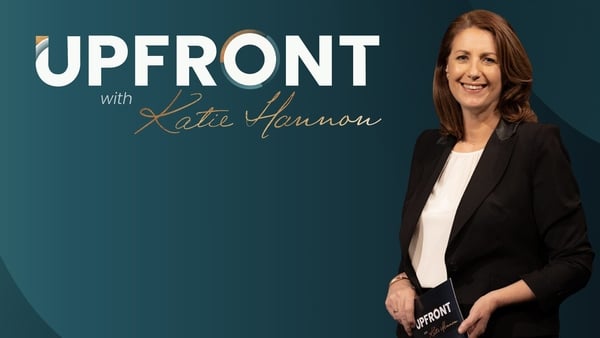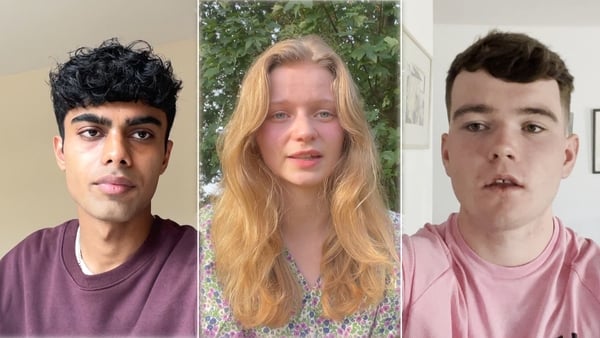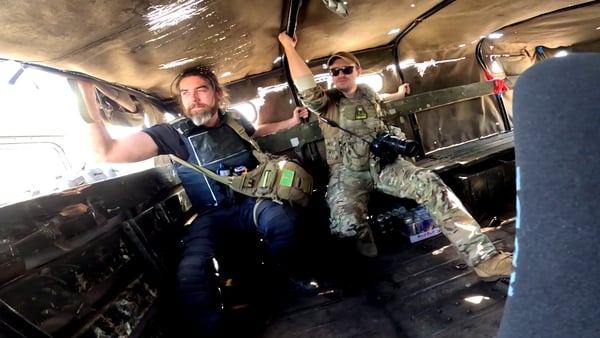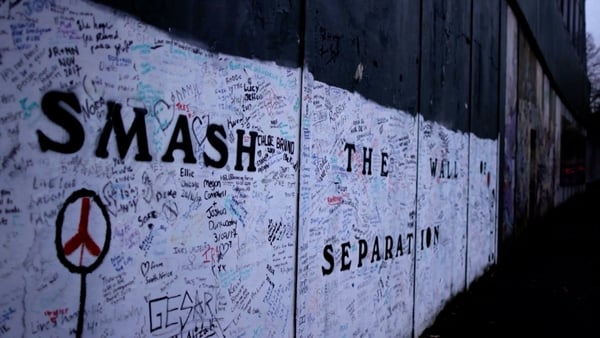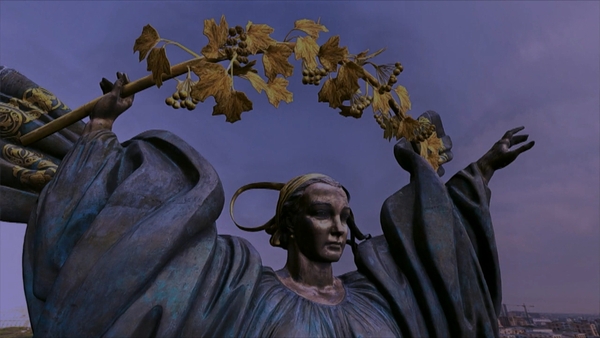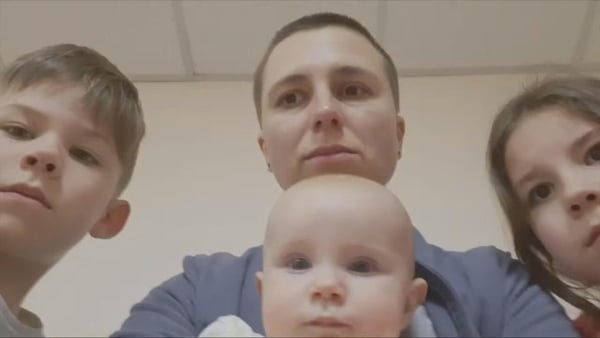Tikhoretsk is not a town you are likely to find easily on a map of Russia. It lies 1,250km south of Moscow and 350km east of Mariupol, Ukraine. Yet given its relative proximity to one of the key battlegrounds of the war in recent months, life has hardly changed in this sleepy Russian town.
"Last year before the 'Special Military Operation', the town was exactly the same as it is now. Only Z letters appear now everywhere. That's the only difference," Kseniya Kamenskaya told Prime Time.
She is a vlogger who lives on the outskirts of the town.
Support for President Vladimir Putin's 'Special Military Operation' is evident across Tikhoretsk. The 'Z' sign associated with the Russian invasion is emblazoned across t-shirts, it stares down from giant billboards, and even cars have the letter spray-painted over their windscreens.
With a population of just over 55,000, Tikhoretsk has not felt the impact of Western sanctions like bigger urban centres, such as Moscow and St Petersburg.
It doesn't have shopping centres lined with Starbucks, McDonald's, Zara and many of the other Western outlets that pulled down the shutters when the invasion began.
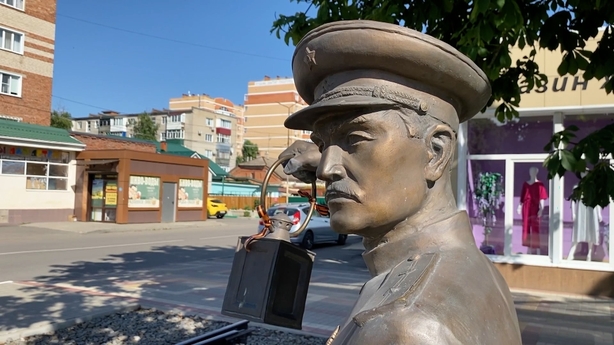
"I can't say that sanctions impact on the town. They didn't impact at all because this town has never had any Burger King, any McDonald's, Zara, H&M. There are no Western shops, only local ones, only Russian ones. Basically, they don't give a s**t," Kseniya said.
Instead, provincial shops and markets sell fruit and vegetables. Independently owned clothes stores cater for the community and a sizeable brewery provides employment, transporting beer across the wider Krasnodar Krai region.
Kseniya interviewed locals in Tikhoretsk for Prime Time, asking their views on the conflict in Ukraine. The majority were in favour of continuing the current campaign and believed Russia would be successful in the end.
One local said: "The pace of our offensive is accelerating in Ukraine and many settlements are liberated now ... That's why there's hope that in the near future Ukrainians will surrender."
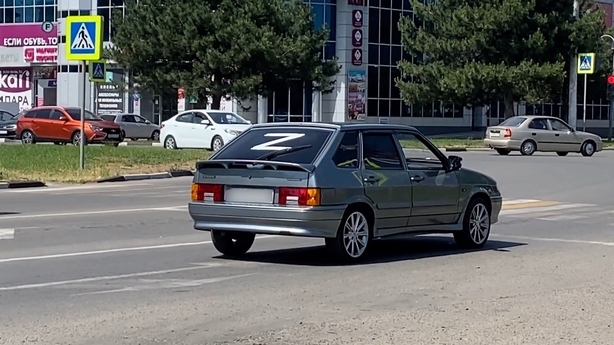
When asked what the 'Z' symbol meant to him, he said it is "for the victory", "for Putin", "for our troops", "for the army", "for our valiant fleet".
On the day filming took place for Prime Time, a local charity concert featuring the children of Tikhorestsk was scheduled in the town's main cultural hall.
The proceeds from the event are to support the Russian military campaign in Donetsk, Ukraine and help children in the region. The organiser explained his support for Russia.
"All these moments are tough and we're thinking about it every day. We're trying to help somehow, that's why we organised the charity concert. To help children and people who are in need," he said.
He went on to say that Russia would eventually win and that the sanctions were having no impact on his daily life in the town.
There were mixed opinions when asked whether local people are worried. Some were concerned and following events closely, others said they "live absolutely normally without caring about it".
One younger interviewee, a former cadet, conceded he had friends taking part in the invasion and five of them are already dead.
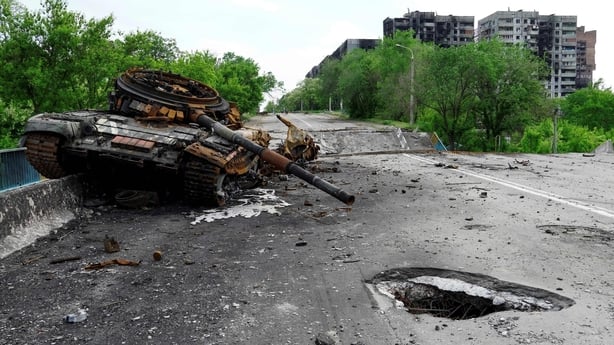
The views offered in Tikhoretsk are symptomatic of the feeling across other towns in Russia.
A recent national poll conducted by a Russian non-governmental research body called the Levada Center, asked the question: Are you concerned about the political and economic sanctions of the Western countries against Russia?
In towns surveyed with a population of less than 100,000 only 17% said they were concerned. 34% said they were not concerned at all and 28% said they were not too concerned.
In May, the Levada Center noted that initial concern about Western sanctions against Russia were decreasing, and the first shock of the sanctions had now passed.
Respondents to the Levada survey were most concerned about the freezing of Russian assets abroad, although young people were more concerned about restrictions on Visa and Mastercard and the departure of Western brands.
At the same time, three-quarters of respondents believed that Russia should continue its invasion despite the sanctions.
However, the reliability of any polls conducted in Russia at the present time are questionable, because of the potential punishments for citizens who speak out against Russia's actions in Ukraine.
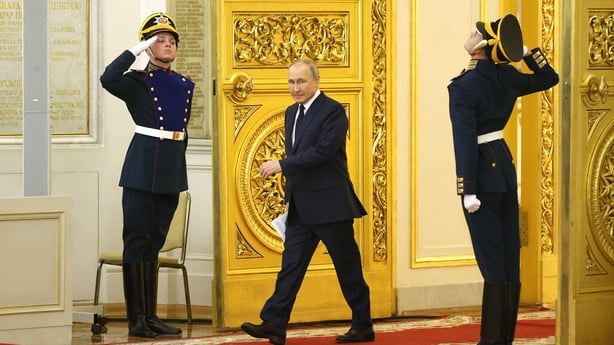
Views in small town Russia are formed against the backdrop of a conflict that has now been raging in Ukraine for nearly five months. Some 23,000 war crimes are currently under investigation by the ICC (International Criminal Court) in the Hague.
At the ICC last week, 45 nations signed a political declaration vowing to investigate suspected war crimes committed by Russian forces in Ukraine.
Russia still rejects committing war crimes in Ukraine, and has repeatedly denied deliberately targeting civilians.
While many rural Russians listen to their news from state television, younger Russians are online and aware of Western coverage.
Kseniya, in Tikhoretsk, interacts with people from many countries via her YouTube channel, where she vlogs about life in Russia.
Kseniya believes that a level of Russophobia has crept in on social media, where some blame the entire Russian population for the events in Ukraine.
She told Prime Time she has received comments from Western people online alleging: "You are responsible for raping women, you are responsible for bombing buildings because you are Russian."
This is not a view she is prepared to tolerate.
Like most Russians, she is trying to get on with daily life and raising her newborn son, just as she was before the conflict began.
"I'm not responsible for anything. I'm an ordinary person like most Russians are. I'm hopeful it's going to end soon, but I don't think that's going to happen," she said.


